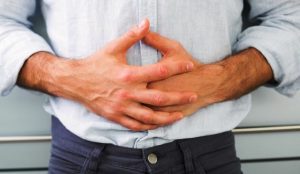One problem many people have with diets is that food tastes so delicious, and, especially when eating out, comes in such large portions that it’s easy to overeat. This makes it hard to stick to a diet and lose weight. But what if you could take something with your food that would help you feel full sooner so you could have a tasty, satisfying meal while leaving half of those calories uneaten on your plate?
That’s the idea some UK researchers have proposed, as they have developed a way to artificially increase the production of a chemical that makes people feel full. We shouldn’t get too excited, though, as initial results show only modest results.
What Makes You Feel Full?
The feeling of being full comes from many sources, but one of them is a chemical known as propionate, which is released when symbiotic microbes in our body break down the fiber in the colon. Propionate released in the colon stimulates the brain to reduce hunger. It’s a way for your body to know that it’s still digesting food and doesn’t need to eat any more yet. It’s one of the most powerful of the long-term mechanisms for preventing snacking.
Researchers sought to increase feelings of fullness by utilizing the propionate pathway. However, they faced a challenge, because propionate that was consumed would be broken down in the stomach, long before it reached the colon where it could stimulate fullness feelings.
To overcome this limitation, they combined propionate with inulin a compound found naturally in grains. This allows the propionate to travel to the colon, where it is released.
Does It Work?
In early tests, the propionate compound, called inulin-propionate ester or IPE for short, gives some benefits. In one test, people given IPE ate 14% less than those given just inulin. Another test involved 60 overweight volunteers. Half were given inulin, while the other half were given IPE. Both groups were told to sprinkle the powder on their food. After 24 weeks, 49 participants remained in the study. Of those given just inulin, six participants, or 25% of the 24 completing the study, had gained over 3% of their body weight, compared to only one or 4% of the 25 taking IPE. In addition, the IPE group had significantly less fat in their abdomens and livers.
This result shows that IPE is not a magic bullet in the fight against weight loss, but it could be helpful. But better results are shown by those who get professional help in their attempts to lose weight. If you are looking for an effective weight loss program, please contact Med-Fit Medical Weight Loss Clinic in the Stapleton area of Denver.

